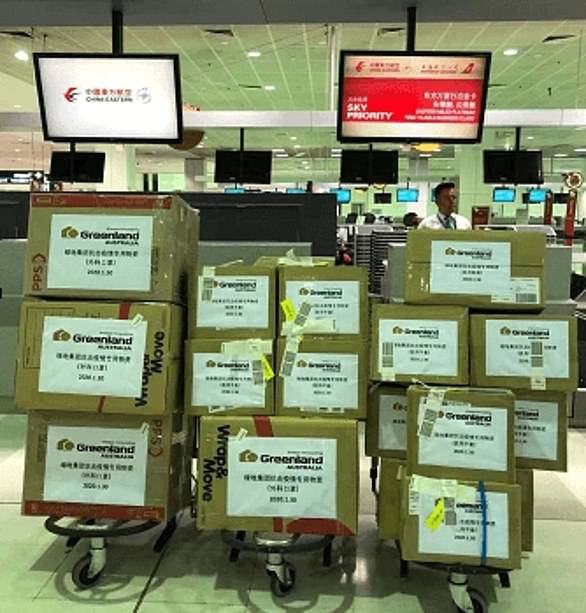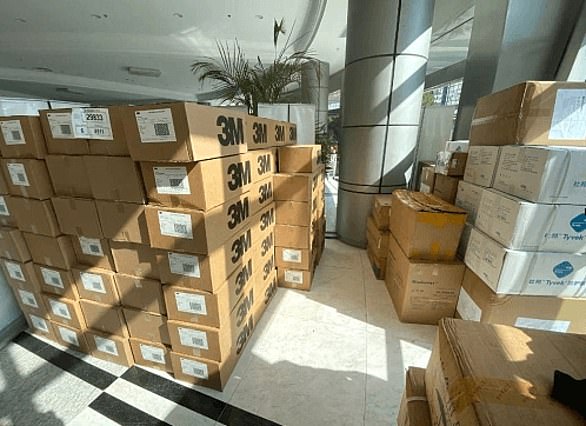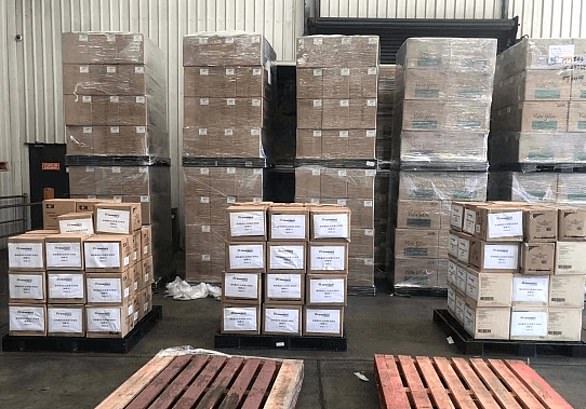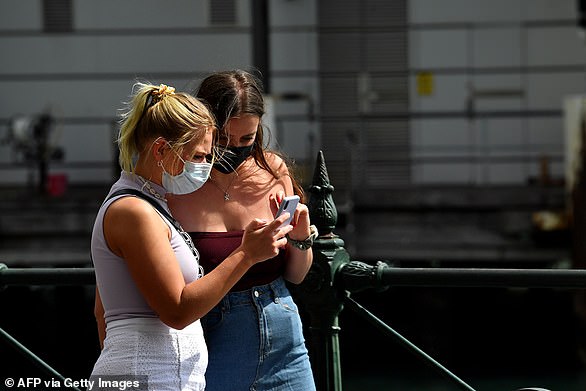Medical supplies and groceries are being shipped in bulk to China while Australia’s supermarket shelves are stripped bare – and doctors resort to buying painting masks from Bunnings fearing there aren’t enough to go around amid the COVID-19 crisis.
Medical staff in Australia are turning to the hardware giant – and even purchasing full-faced snorkelling kits from other retailers in fear of a looming protective gear shortage.
Doctors say they are worried about supplies, and blame the government for creating the ‘mad’ situation by not assuring health workers enough equipment has been sourced to protect them as the pandemic continues to take hold.
‘No one… is getting information about what’s going on [with medical supplies] and although the case numbers are still low, people are starting to worry. What we can’t tolerate… is not knowing what’s going on,’ a surgeon at a Sydney hospital told The Australian.
Meanwhile, a Chinese property company with Australian offices told employees earlier this year to stop their normal work – and instead source face masks, hand sanitisers, thermometers and other medical items to be shipped to China.
‘Basically all employees, the majority of whom are Chinese, were asked to source whatever medical supplies they could,’ a whistleblower told the Sydney Morning Herald.
This week, A Current Affair exposed a Melbourne warehouse full of Australian products, including A2 milk powder, medications, bathroom supplies and baby formula being packed for export to China.
When asked where the goods were going, one of the workers said they were bound for distant shores.
‘Probably to mainland (China), or somewhere like Hong Kong, Taiwan something like that,’ said the worker, wearing a surgical face mask.
The process is entirely legal.

Pallet loads of essentials including A2 milk powder, baby formula and medical supplies being prepared for export, A Current Affair has exposed

Warehouse workers loading and moving the boxes of supplies bound for China
But former Victorian Senator Derryn Hinch described such operations as ‘disgraceful’.
‘It could cost lives in this country,’ he said.
Medical experts are worried a potential shortage of personal protective equipment (PPE) will leave frontline medical staff exposed to infection and unable to care for patients.
ANU College of Health and Medicine Professor Shane Thomas told Daily Mail Australia the country did not have enough masks, gowns and eye shields.
‘It’s something personally I have a lot of concern about,’ he said.
‘The fact we don’t have enough on hand is a problem. We have two big shortages: PPE and (coronavirus) testing kids.’

Soldiers from the ADF (pictured) drafted into making facemasks in Victoria as the shortage is so dire. After years of globalism, Australia no longer has a healthy manufacturing sector
The shortage is so dire the Australian army has pitched in to make more face masks at the Med-Con factory near Shepparton.
On Sunday meanwhile, news.com.au exposed the export of 90 tonnes of medical supplies including bulk surgical masks which were flown from Perth Airport to China on February 8.
In a separate incident, Chinese-owned property developer Risland Australia flew 80 tonnes of medical supplies on a corporate jet to Wuhan in late February.

Bulk supplies of vital medical items were shipped from Sydney to China at the request of Beijing-backed property developers Greenland Group

Greenland Group said it collected three million protective masks, 700,000 hazmat suits and 500,000 pairs of medical gloves during the global effort
Risland is owned by one of China’s largest property developers, Country Garden Holdings.
‘The chartered plane with 90 tons (82 tonnes) of medical supplies, including 100,000 most needed protective coveralls and 900,000 pairs of medical gloves, has successfully departed from Sydney and arrived in Wuhan on 24 Feb,’ Risland said on LinkedIn.
Another Chinese property company, Greenland Group, retasked its employees to purchase face masks, hand sanitisers, antibacterial wipes, thermometers, Panadol and other medical items in bulk for shipment to China.
As countries round the world battle the coronavirus people from the United States to the Czech Republic are sewing their own masks, as studies show that while improvised masks are not as good as surgical masks, they are better than nothing.
A Federal Health Department spokesperson said on March 24 that the government had contracted suppliers to provide 54 million surgical masks and P2 respirators for the national medical stockpile.
‘A significant supply of P2 and surgical masks remain in the National Medical Stockpile, and will be directed to areas of greatest need while additional PPE arrives,’ the spokesperson said via email.

Meanwhile, Australia’s total confirmed coronavirus cases has soared to 4,220, including 18 people who have died.
The number of confirmed New South Wales coronavirus cases on Monday rose to 1918 – an increase of 127 on the previous day.
This is a significantly lower rate of increase than in previous days when NSW authorities were reporting up to 200 new cases per day.
But 228 cases of COVID-19 in NSW do not have a clear source of transmission – the key statistic by which authorities are gauging the success of shutdown measures in halting the virus’ spread.
Some 26 NSW coronavirus patients are in intensive care.
Australia is now enforcing new rules limiting gatherings to two people unless with immediate family.
The current restrictions to curb COVID-19 in NSW will remain in place for a month before being reassessed, Premier Gladys Berejiklian says, meaning a tougher lockdown is unlikely in the short term.
Ms Berejiklian said people in their 20s and 30s were the worst offenders when it came to flouting social isolation rules and she implored them not to put the vulnerable at risk.
Unless there was a significant and unexpected spike in COVID-19 cases in the state, the current restrictions would not be revised for a month, she said.
‘I just want to assure everybody things are in review constantly – this is based on expert advice,’ Ms Berejiklian said.
‘Health experts have told us they’d like to maintain the restrictions we’ve put in place for at least the next month and then assess.’
NSW Police Commissioner Mick Fuller said police would no longer issue cautions for those flouting self-isolation rules – with $1000 on-the-spot fines to be issued.
Police could also arrest and charge those repeatedly ignoring health orders, with a maximum penalty of six months in prison.
‘The power of discretion is such an important one for police – in fact, it’s our strongest power. But I’ll ask police today to really be out there enforcing this,’ Mr Fuller told reporters.
‘We would much rather work with the community on this.’
A Sydney man is already behind bars for allegedly flouting his home self-quarantine twice on Saturday before trying to leave the serviced apartment in which he had been confined.
The number of confirmed NSW cases from the Ruby Princess cruise ship, meanwhile, had jumped to 189 on Monday, with three crew members evacuated from the ship to a Sydney hospital.
In Victoria, Premier Daniel Andrews has warned Victorians that they will be punished if they flout the latest restrictions on outdoor gatherings of more than two people.
‘If you are outside, or in your backyard, gathering in more than two people, if you are having friends over for dinner or friends over for drinks that are not members of your household, then you are breaking the law,’ Mr Andrews said.
‘Victoria Police will not hesitate to take action against you.’
Playgrounds, skate parks and outdoor gyms will also close under the restrictions.
Mr Andrews said the step up in restrictions will help save lives, and slammed the poor behaviour of Victorians who flocked to beaches over the weekend.
‘No gathering with friends is worth someone’s life,’ he said.
‘Unless you want to be burying an elderly relative or your best mate, or your parents, if they’re younger, do the right thing.
‘If everyone follows these rules and they are as simple as they can be, then we will slow the speed of this virus,’ he said.
‘We will save, lives we will protect our health system, we will get through this together and we will get to the other side of it quicker.’
The daily increase in cases has reduced to around 10 per cent from a high of 25 per cent.





